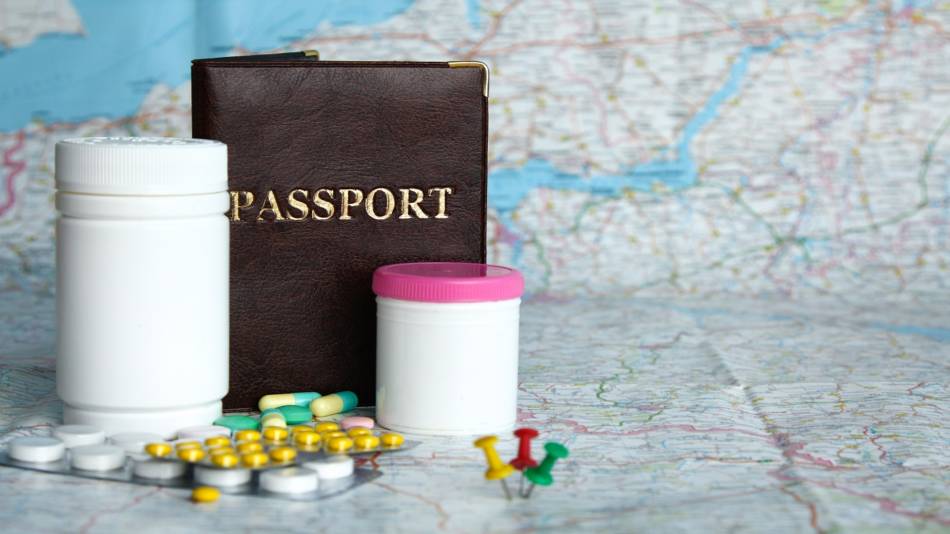Our Members Asked:
Which supplements are helpful to have when traveling? Any tips on how to best store supplements on trips?

Answer:
Travel can upset sleep and eating patterns, as well as trigger motion sickness and subject you to infections. As discussed below, several supplements may be helpful when traveling. (For more about each supplement, including our tests and Top Picks for each, use the bold links.)
Supplements that may help during travel
If you need a little help falling asleep, melatonin can be used and it may help you avoid jet lag after a long flight.
Keeping a few nutrition or meal replacement bars in your travel bag or purse may come in handy in case you experience unexpected transportation delays, or an outing takes longer than expected.
If you will be trying new foods (or just eating out more often) during your trip, you may want to consider bringing along supplements that may help with indigestion or heartburn, such as digestive enzymes and lactase supplements.
There is some evidence that ginger may be helpful if you are prone to motion sickness.
Taking certain probiotics several days before and during your trip may reduce the likelihood of developing traveler's diarrhea.
Probiotics may also offer some protection against colds and respiratory infections. If you do develop a cold, zinc lozenges may help to reduce the severity and/or duration of symptoms. (If you develop a cold while taking vitamin C, it may modestly reduce symptom severity and duration, but starting vitamin C supplementation after symptoms have already begun may not be helpful.)
Proper storage of supplements during travel
Keep in mind when traveling that certain supplements, including some probiotics, fish oil and protein powders, are particularly sensitive to heat and moisture and should be packed and stored accordingly. Do not leave them in your car, and, when flying, keep them in your carry-on luggage rather than checking them with baggage since bags may sit out on the tarmac or in other environments which are not temperature controlled. (Remember, however, that liquid supplements in amounts greater than 3.4 ounces (100 mL), must be stored in checked luggage and cannot be kept in carry-on luggage.)
Although not required by the TSA, it may be helpful to keep your supplements in their original containers so they can be easily identified by security, especially if you are traveling abroad. In general, traveling in or out of the U.S. with supplements is permitted by the FDA as long as amounts are considered reasonable for personal use.
Radiation from airport security scanners is not likely to affect the quality or safety of vitamins and supplements. According to the FDA, "There are no known adverse effects from eating food, drinking beverages, using medicine, or applying cosmetics that have been irradiated by a cabinet x ray system used for security screening." A typical dose of radiation received by objects going through these systems is significantly lower than those used to irradiate food, and one study of medications such as acetaminophen found no change in drug content or quality after exposure to higher levels of radiation than used in typical scanners (Uehara, Drug Dev Ind Pharm 2015). Nevertheless, you may request that medications (and likely, supplements as well) be screened visually rather than by X-ray if you prefer.
Can you skip a few days of supplements during travel?
If you’re going away for a week and forget to bring your vitamin or mineral supplements, you should generally be okay going without -- unless you are in the process of treating a diagnosed deficiency, such iron deficiency. If have no deficiencies, be aware that it usually takes months before lack of any nutrient will cause a symptomatic deficiency. In the meantime, try to increase intake of foods that naturally provide the nutrients that were in your supplements, or exposure to sun if you need more vitamin D.
If you have some favorite travel supplements or related tips, share them in the Comments section below!
Join today to unlock all member benefits including full access to all CL Answers and over 1,400 reviews.
Join NowAlready a member? Sign In Here.
Join now at www.consumerlab.com/join/










Submit your comment
This feature is restricted to active members.
Join now to add comments and get all member benefits, including over 1,400 reviews.
Join NowAlready a member? Sign in here.